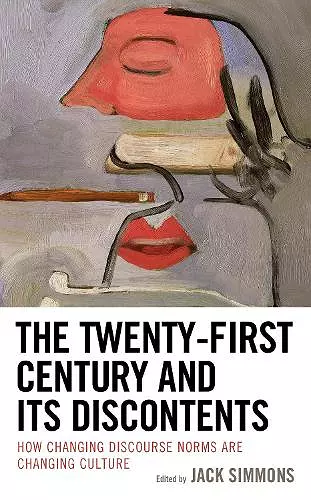The Twenty-First Century and Its Discontents
How Changing Discourse Norms are Changing Culture
Format:Paperback
Publisher:Lexington Books
Published:18th Aug '22
Currently unavailable, and unfortunately no date known when it will be back

American culture is changing, a sentiment echoed in phrases such as “the new normal,” and “in these uncertain times,” that regularly introduce all forms of public discourse now, signally a national sense of vulnerability and transformation. Cultural shifts generally involve multiple catalysts, but in this collection the contributors focus on the role changing discourse norms play in cancel culture, corporatism, the counter-sexual revolution, racialism, and a radically divided political climate. Three central themes arise in the arguments. First, that contemporary discourse norms emphasize outcomes rather than shared understanding, which support institutional and political goals but contribute to the contemporary political divide, and the notion that we are engaged in a zero-sum game. These discourse norms give rise to a form of Adorno’s administered world, such that we order society according to dominant opinions, which generally means those well acclimated to institutional and corporate culture. Finally, as Arendt feared, the personal has become political, meaning that the toxic public discourse invades private discourse, reducing personal autonomy and leaving us perpetually under the scrutiny of institutional authority.
In The Social Construction of Reality (1966), Peter Berger and Thomas Luckmann define an intellectual as “an expert whose expertise is not wanted by society at large.” Here, Simmons and the other contributors see the hand of intellectuals and other experts in what they argue is the principal discontent of the 21st century thus far: Americans transferring responsibility for their actions and language to experts who have inserted “methodological reasoning,” “means-end reasoning,” and “strategic discourse” into relationships that were once governed by each individual’s own construction of self and understanding of their obligations to others.... The argument that links these pieces—that Americans are sacrificing their personal autonomy to follow the dictates of an elite that seeks its own advancement—is one...with which even the most skeptical reader must contend. Recommended.
* Choice *In the 21st Century, what are the conditions of production that make discourse legible and the conditions of reception that allow and delimit its performative efficacy? All of the lucid and compelling essays in this book address, with insight and cogency, historically specific aspects of these questions. Addressing a wide variety of contemporary discursive practices, from identity politics to cancel culture, from criteria for informed consent to the preconditions for sexual consent, from corporatism to tribalism, from institutional norms to systemic racism, this collection exposes how what had been traditionally called the communication triangle has evolved into a cluster of circular logics. Tellingly revealing how these logics threaten the capacity for unified social action, the essays in this book are requisite reading in this time of crises and pandemics.
-- Alan Nadel, University of KentuckyThis is a fascinating and timely collection of essays on topics of great current importance, in particular, social and racial justice, and our current pandemic. The analysis offered, for instance, on social justice discourse by Robert Gressis is both fair-minded and deeply insightful. Erik Nordenhaug and Jack Simmons contribute a very interesting chapter on outsourcing our moral compass to 'hired cricket voices of moral reasoning emanating from professional standards boards.' Kenneth B. McIntyre and Stacy G. Ulbig’s contribution is an excellent empirical study of how, by promoting some forms of diversity while ignoring others, the modern university is failing at its task of delivering a truly liberal education. Those are just a few of the many fine essays in this volume: No one will agree with all of them, since they emerge from a truly diverse set of viewpoints. However, the reader should find all of them worthy of her attention.
-- Eugene Callahan, New York UniversityIn addition to taking on a wide variety of important issues--from sexual consent and race to COVID-19 and social diversity--authors of this exceptional collection examine such issues from diverse social and philosophical perspectives. Highly recommended for readers interested in gaining a deeper and nuanced understanding of today’s major social and political conflicts.
-- Michael Zimmerman, Tulane UniverISBN: 9781793608017
Dimensions: 227mm x 152mm x 19mm
Weight: 472g
290 pages